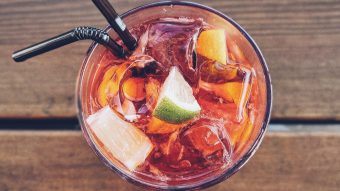September 17, 2020
Contact: Eric Stann, 573-882-3346, StannE@missouri.edu
The views and opinions expressed in this “for expert comment” release are based on research and/or opinions of the researcher(s) and/or faculty member(s) and do not reflect the University’s official stance.

Less social interaction, increased isolation and more daily life stressors are just some of the challenges people face while going about their daily lives during the COVID-19 pandemic. For people who are also dealing with addictions to alcohol, these sudden life changes also make it challenging to cope with their addictions.
Denis M. McCarthy is a professor of psychology in the MU College of Arts and Science, and the director of the Missouri Center for Addiction Research and Engagement, or MO-CARE, at the University of Missouri. Recently, this alcohol addiction expert shared how the COVID-19 pandemic has affected people with an alcohol use disorder and other addictive behaviors related to alcohol consumption.
How is the pandemic exacerbating some people’s struggles with addiction to alcohol?
We know the pandemic has led to a significant increase in daily stressors for many people. In addition to the stress caused by social distancing and increased isolation, people can also experience unexpected life changes during the pandemic, including job loss, business closures, job uncertainty and other financial stressors. Each type of stress is associated with an increased risk of alcohol and drug use. At a population level, we have seen this happen during other significant recessions and financial downturns.
Although only a few studies have been completed at this point during the pandemic, early indications suggest it is changing the way people choose to drink — some people have increased their drinking habits while others significantly decreased. These changes are likely based on people’s drinking preferences before the pandemic began. Those who liked to drink socially — at parties, bars, restaurants — likely decreased their overall alcohol consumption. On the other hand, people who may have increased their drinking during the pandemic were likely individuals who preferred to primarily drink at home to relax and cope with stress.
Things are a bit more complex for people medically diagnosed with an alcohol use disorder. While we don’t yet know how the pandemic is affecting changes in drinking habits for this group, we believe the pandemic is making it harder for people to seek treatment for alcohol or drug addiction, or to receive medication to support their abstinence.
How can social distancing and isolation during the pandemic present difficulties for people dealing with issues related to alcohol addiction?
This pandemic has led to more isolation than what most people typically experience. Drinking is a way people cope with loneliness, isolation and boredom. For people likely already doing this before the pandemic, their behaviors may have increased. The problem is that alcohol is not a good method of reducing these negative feelings. If anything, it’s likely to increase these feelings, and we know that people who use alcohol to cope with negative emotions are more likely to have negative consequences from their drinking.
How can people’s mental health and behaviors change as they continue consuming alcohol?
Alcohol has both short-term and long-term effects on a person’s mental health and behavior. Over time, we know heavy alcohol use exacerbates many people’s mental health problems. In particular, people with an alcohol use disorder are more likely to experience other mental health issues such as depression or anxiety. People also use alcohol to improve their sleep, but it isn’t effective at that and typically makes things worse.
There is also a concern about the short-term effects of alcohol on people’s judgement and behavior during the pandemic. Keeping safe during this pandemic takes hard work and some degree of vigilance. When people are in public, such as bars and restaurants, this becomes even more important. We know once someone consumes even a moderate amount of alcohol, it gets harder for them to keep social distancing practices in mind or to be aware of the ways they might be putting themselves and others at risk. Putting restrictions on the number of people who can be in a bar or at a gathering is helpful, but as people consume alcohol, social distancing practices are more likely to break down, even without people consciously making decisions to do so.
How can virtual check-ins help someone dealing with addiction to alcohol? What advice can you give to people who are struggling, or know someone who is, during this pandemic?
The pandemic has made it harder for people to access addiction treatment. Many mental health and addiction professionals have switched to providing virtual care during the pandemic as much as possible. For people who can easily access virtual care, it can be a useful replacement for in-person care. However, for those who cannot access virtual care, the inability to access addiction treatment can hamper their recovery.
In addition, one way individuals with alcohol and substance use disorders can recover from their addiction and maintain their recovery is by participating in programs like Alcoholics Anonymous. These programs strongly rely on social support elements to help people stay sober. While this has become more difficult during the pandemic, AA’s general service office has resources to facilitate meetings online by clicking here.
Editor’s Note: To view McCarthy’s bio, please click here.
To arrange an interview with Denis M. McCarthy, please contact Eric Stann at 573-882-3346 or StannE@missouri.edu.
